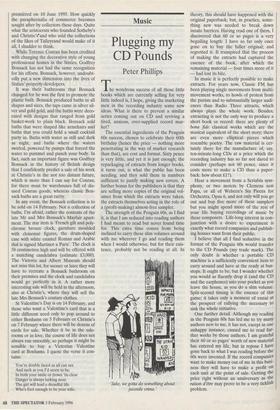Music
Plugging my CD Pounds
Peter Phillips
The wondrous success of all those little books which are currently selling for very little indeed is, I hope, giving the marketing men in the recording industry some new ideas. What is there to prevent a similar series coming out on CD and reviving a tired, anxious, over-supplied record mar- ket?
The essential ingredients of the Penguin 60s success, chosen to celebrate their 60th birthday (hence the price — nothing more penetrating in the way of market research than that), are cost and format. Sixty pence is very little, and yet it is just enough; the repackaging of extracts from longer books, it turns out, is what the public has been needing; and they sold them in numbers sufficient to justify making new covers. A further bonus for the publishers is that they are selling more copies of the original vol- umes from which the extracts were taken, the extracts themselves acting in the role of a (profit-making) almost-free sampler.
The strength of the Penguin 60s, as I find it, is that I am seduced into reading authors I had meant to read but never found time for. This extra time comes from being inclined to carry these slim volumes around with me wherever I go and reading them when I would otherwise, but for their exis- tence, probably not be reading at all. In Jake, we gotta do something about juvenile crime.' theory, this should have happened with the original paperback; but, in practice, some- thing new was needed to break down innate barriers. Having read one of them, I discovered that 60 or so pages is a very beguiling length: I have so far only once gone on to buy the fuller original; and regretted it. It transpired that the process of making the extracts had captured the essence of the book, after which the remaining material — four times more of it — had lost its bite.
In music it is perfectly possible to make extracts. For years now, Classic FM has been playing single movements from multi- movement works, to howls of protest from the purists and to substantially larger audi- ences than Radio Three attracts, which always plays the whole work. Besides, extracting is not the only way to produce a short book or record: there are plenty of bona fide classical works which are the musical equivalent of the short story; there are even more elliptical pieces which resemble poetry. The raw material is cer- tainly there for the manufacture of, say, ten-minute-long CDs at a price which the recording industry has so far not dared to consider (perhaps not 60 pence, since it costs more to make a CD than a paper- back: how about £1?).
Hear a movement from a Scriabin sym- phony, or two motets by Clemens non Papa, or all of Webern's Six Pieces for Orchestra, Opus 6, and not only will you go out and buy five more of these samplers but you might spend more of the rest of your life buying recordings of music by these composers. Life-long interest in con- junction with a desire to experiment is exactly what record companies and publish- ing houses want from their public.
I believe that all I find seductive in the format of the Penguin 60s would transfer to the CD Pounds (my trade mark). The only doubt is whether a portable CD machine is a sufficiently convenient item to carry around and have at the ready at bus- stops. It ought to be; but I wonder whether you would as fluently drop it (and the CD and the earphones) into your pocket as you leave the house, as you do a slim volume. Split-second timing is the essence of this game; it takes only a moment of ennui at the prospect of rallying the necessary to sink the whole initiative.
One further detail. Although my reading in the Penguin 60s has led me to try many authors new to me, it has not, except in one unhappy instance, caused me to read fur- ther works by those authors. I am grateful their 60 or so pages' worth of new material has entered my life, but in repose I have gone back to what I was reading before the 60s were invented. If the record companies want to make money out of me in this busi- ness they will have to make a profit on each unit at the point of sale. Getting the price right without an anniversary as the raison d'être may prove to be a very ticklish problem.


































































 Previous page
Previous page